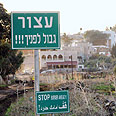
Warning signs on the road to Ghajar
צילום: גיא רונן
Ghajar council asks UN to prevent division of village
Village split by Lebanese border campaigns against transferring rule of its northern half to UNIFIL hands, claims move would further separate families. Local council demands inclusion in decision-making process, reiterates call to see village be returned to Syrian sovereignty
The future of a small village on Israel's northern border hangs in the balance as its fate is debated in the halls of the United Nations in New York.
Recent reports indicate the UN is headed towards adopting a proposal to place the northern half of Ghajar under the control of the United Nations Interim Force in Lebanon (UNIFIL). This as part of Security Council Resolution 1701, which was passed with the end of the Second Lebanon War.
The transfer of control from the IDF's hands to UNIFIL would be gradual.
Members of Ghajar's village council met on Monday with local dignitaries and representatives to discuss the situation. Following the meeting the council dispatched an urgent letter to the UN's special coordinator for Lebanon, Michael Williams, asking him to include the residents in any decisions being made regarding the fate of their village.
The council also called for Ghajar to remain unified. A copy of the letter was sent to UNIFIL commander, General Claudio Graziano.
Some 12,000 people live in Ghajar, two-thirds of them in its northern section – which lies to the north of the internationally demarcated border between Israel and Lebanon. The residents, however, see the village as an inseparable part of Syria. The land was seized by Israel from Syria during the Six Day War in 1967.
Ghajar residents fear that handing over the northern part of their village to UNIFIL would separate families, and further burden their day-to-day lives; already complicated since Israel's withdrawal from southern Lebanon in May 2000.
Stuck between a rock and a hard place, residents carry Israeli ID cards but live between the fences erected by the IDF and the United Nations to prevent the smuggling of arms and drugs into Israel, as well as to prevent infiltrations by terror groups. This makes it exceedingly difficult for the village to make regular use of Israeli utilities and services.
Some of Ghajar's residents also retain Syrian citizenship, which was given to them when the village was part of the Quneitra Governorate. Residents are adamant about seeing their village returned to Syria along with the rest of the Golan Heights as part of a future peace agreement between Israel and Syria, and the implementation of UN Resolution 242.
"We ask to be part of any debate being held on the international level regarding the future of the village. We will not accept any decision that would divide families and damage our rights. We will stay on the lands our parents and grandparents worked and passed on to the next generations," said the letter.
The village council invited Williams to Ghajar for a meeting, in which they hope to convey the sensitivities and complexities of the situation. Members said their decision not to address Williams though official Israeli channels stemmed from desperation over the lack of understanding from all sides involved, and out of a sense of confidence in the ability of the UN to understand and work towards resolving the problem in a transparent and earnest manner.










